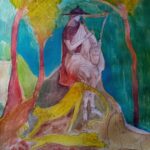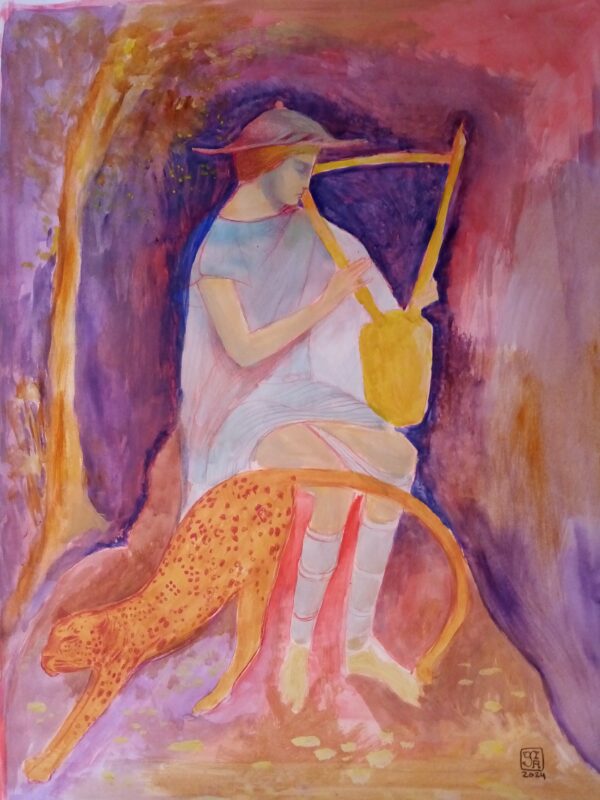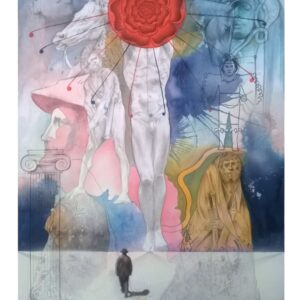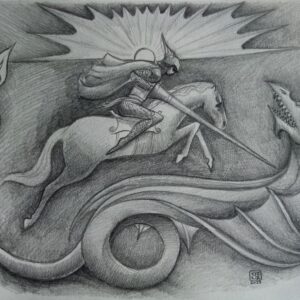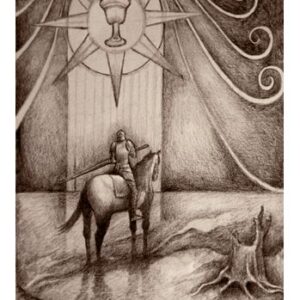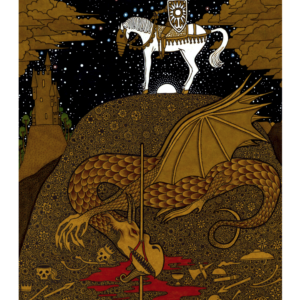Description
Orpheus calming the animals with his lyre.
Preliminary drawing.
Mixed media on Fabriano.
23 X 17 inches
Includes custom frame upon purchase.
The Greek myth of Orpheus calming the animals with his lyre is a powerful and captivating tale that has been passed down through generations. Orpheus, a legendary musician and poet, possessed unparalleled skill with the lyre, a stringed musical instrument similar to a harp. His music was so enchanting that it could tame even the wildest beasts and soothe the fiercest of tempers. In this myth, Orpheus used his musical gift to calm a group of ferocious animals sent to attack him and his wife, Eurydice, thus demonstrating the transformative power of music and the inherent connection between music and the natural world.
Orpheus was known as the son of Apollo, the god of music and poetry, and Calliope, the muse of epic poetry. His lineage alone indicated his exceptional talent and his destined greatness as a musician and poet. As he grew older, Orpheus honed his skills and developed a deep understanding of the power of music to affect emotions and bring harmony to the world around him. This understanding would prove invaluable in the face of danger when he encountered the savage creatures sent to harm him.
The story of Orpheus calming the animals with his lyre begins with his journey to retrieve his beloved wife, Eurydice, from the underworld. After losing Eurydice to a tragic accident, Orpheus descended into the depths of Hades in a desperate attempt to bring her back to the land of the living. Along the way, he encountered a variety of obstacles, including the ferocious beasts that guarded the entrance to the underworld. Rather than resorting to violence or fear, Orpheus chose to use his lyre to calm and pacify the creatures, demonstrating his extraordinary gift and his deep connection to the natural world.
As Orpheus played his lyre, the animals listened intently, their aggressive instincts fading away as they became entranced by the beauty of his music. The snakes uncoiled, the lions lay down peacefully, and the birds ceased their cries, all under the spell of Orpheus’s enchanting melody. Even the Furies, the vengeful spirits of the underworld, were moved to tears by his hauntingly beautiful music, illustrating the profound impact that music can have on even the most hardened of hearts.
Orpheus’s ability to calm the animals with his lyre speaks to the transformative power of music and its ability to transcend language and cultural barriers. Through his music, Orpheus was able to communicate with the animals on a primal level, tapping into their instincts and emotions in a way that words alone could not. This demonstrates the universality of music as a form of expression and communication, capable of evoking powerful emotions and fostering a sense of connection and unity among all living beings.
The myth of Orpheus calming the animals with his lyre also highlights the close relationship between music and the natural world, suggesting that music has the power to harmonize and balance the forces of nature. By calming the animals with his music, Orpheus was able to restore peace and order to a chaotic and dangerous situation, illustrating the role that music can play in promoting harmony and unity within the natural world. This theme resonates with the ancient Greek belief in the interconnectedness of all living beings and the importance of maintaining balance and equilibrium in the natural world.
Furthermore, Orpheus’s ability to calm the animals with his lyre reflects the idea of music as a universal language that transcends cultural and linguistic boundaries. Regardless of their species or origin, the animals were able to understand and respond to Orpheus’s music, demonstrating the power of music as a form of communication that can bridge differences and foster understanding between individuals and beings. This notion underscores the transformative and unifying nature of music, highlighting its ability to create bonds and connections between disparate entities.
In addition to its universal appeal, the story of Orpheus calming the animals with his lyre emphasizes the moral lesson of compassion and empathy towards all living beings. By choosing to use his music to soothe and pacify the creatures threatening him, Orpheus demonstrated a deep respect for the natural world and a willingness to find peaceful solutions to conflict rather than resorting to violence or aggression. This act of kindness and understanding towards the animals reflects the ancient Greek belief in the importance of harmony and balance in all aspects of life, including the relationship between humans and the natural world.

